|
 Holidaymakers Holidaymakers
These
people will travel to a holiday destination for a typical
resort holiday. Many travel to European resorts in Mediterranean
countries like Spain, Italy or Greece in search of the sun
or to France and Switzerland on skiing holidays.
Others
may travel a bit further to Florida
in the USA or a Caribbean resort and some of the more adventurous
will even travel to more exotic locations such as Kenya in
East Africa or Thailand in South East Asia. Some will even
venture as far as Australia for their holidays. Others may
visit some of the world's most famous resorts and hotels to
wine and dine and play casino games and generally live the
high life just like the rich and famous for a few days.
Because
these travellers are going to a holiday resort with a
hotel with all the comforts of home, they will usually have
easy access to medical facilities should they be required,
and therefore, they should be able to obtain any medicines
they require from a local pharmacy or medical facility.
These travellers usually remain within easy reach of a
doctor or a hospital whilst they are away which is a much
better option than self medication for serious illnesses.
They may also include children, the elderly, pregnant women
and the disabled who should all seek medical assistance if
they become ill.
 However,
a small medical kit for treating minor ailments should they
arise will be of great value and convenience. The information
supplied in this site will also prove valuable to these travellers
and the interactive page can also provide a list of the medicines
they should take with them. However,
a small medical kit for treating minor ailments should they
arise will be of great value and convenience. The information
supplied in this site will also prove valuable to these travellers
and the interactive page can also provide a list of the medicines
they should take with them.
Vaccinations take time. A doctor or nurse should be
consulted as soon as possible, ideally at least four weeks
before travelling. Late bookings can leave insufficient time
for vaccinations to become fully effective.
Stomach upsets and diarrhoea are very common. Contaminated
food and water is a major cause of illness and care is especially
important when eating out and in countries where local hygiene
is poor. More spices or oil in food as well as alcohol can
also lead to stomach upsets.

Sunburn is preventable,
so always use an appropriate sunscreen when going outside
into the sun.
See
the sunburn page for more
details.
For an excellent range of quality discount luggage with
best prices and selection on all types of suitcases, carry-on
luggage, briefcases, handbags, wallets, laptop cases, garment
bags, sports bags, rucksacks and travel accessories, go to:-

 Business Travellers
Business Travellers
 This
group of travellers for the main part fall into the same
category as the previous group in so far
as they are never far from medical assistance when it is required.
The main difference being that the majority will be travelling
to cities rather than holiday resorts. This
group of travellers for the main part fall into the same
category as the previous group in so far
as they are never far from medical assistance when it is required.
The main difference being that the majority will be travelling
to cities rather than holiday resorts.
A small group however, will occasionally travel to
more remote areas in the course of their business. In this
instance, a small medical kit for treating minor ailments
will be of great value and convenience. The information supplied
in this site will also prove valuable to these travellers.
Tiredness and jet lag may affect your business efficiency.
Rest before and after travel is important. Persons with occupations
which involve frequent travelling should consider vaccinating
in anticipation of overseas assignments in order that the
vaccinations achieve optimum protection, e.g. a first yellow
fever vaccination certificate is not valid for 10 days.
 Contaminated
food and water is a major cause of illness in business
travellers although less so if eating and drinking is confined
to first class hotels. Avoiding unsafe food and water can
sometimes be difficult, when being entertained by enthusiastic
hosts, unless a strategy is planned in advance! Contaminated
food and water is a major cause of illness in business
travellers although less so if eating and drinking is confined
to first class hotels. Avoiding unsafe food and water can
sometimes be difficult, when being entertained by enthusiastic
hosts, unless a strategy is planned in advance!
It may be wise to always carry an anti-diarrhoeal preparation
to make sure that you are able to attend important business
meetings or to help you make long journeys without having
to make frequent and inconvenient use of the toilet.
Unfamiliar surroundings, especially when combined with
excessive alcohol consumption can lead to uncharacteristic
behaviour including sexual risk taking. "Unsafe" sex, particularly
with commercial sex workers, may pose serious infections risks
including HIV.
 Backpackers
& Adventure Travellers Backpackers
& Adventure Travellers
 Backpacking
is a term that has historically been used to denote a form
of low-cost, independent international travel. Terms such
as independent travel and budget travel are often used. Backpacking
is a term that has historically been used to denote a form
of low-cost, independent international travel. Terms such
as independent travel and budget travel are often used.
The factors that traditionally differentiate backpacking
from other forms of tourism include the use of a backpack
or other luggage that is easily carried for long distances
or long periods of time; the utilization of public transport
as a means of travel; a preference for inexpensive lodging
such as youth hostels; a longer duration to the trip when
compared with conventional vacations; and an interest in meeting
the locals as well as seeing the sights.
Backpacking is typically associated with young adults, who
generally have fewer obligations and thus more time to travel.
They also have less money to spend on hotels or private vehicles.
 The
definition of a backpacker has evolved as travellers from
different cultures and regions participate. They also display
a common commitment to a non-institutionalised form of travel,
which identifies them as backpackers. The
definition of a backpacker has evolved as travellers from
different cultures and regions participate. They also display
a common commitment to a non-institutionalised form of travel,
which identifies them as backpackers.
Backpacking as a lifestyle and as a business has grown considerably
in the 2000s as a result of low-cost airlines and hostels
or budget accommodations in many parts of the world. Digital
communication and resources make planning, executing, and
continuing a long-term backpacking trip easier than before.
Of
importance in backpacking is a sense of authenticity.
Backpacking is perceived as being more than a vacation, but
a means of education. Backpackers want to experience the "real"
destination rather than the packaged version often associated
with mass tourism.
There is also the concept of witnessing real life with more
involvement with local people.
However,
even though one of the primary aims of backpacking is
to seek the "authentic," the majority of backpackers
tend to spend most of their time interacting with other backpackers,
and interactions with locals are of secondary importance.
Some
useful backpacking websites include:-
 Campervan
Travel
is very similar to backpacking in the sense that it a form
of independent travel. The main differences of campervan travel
are; having your own mode of transport and lodgings but not
the constraint on weight to be carried. Like backpackers,
campervan travellers are able to access remote locations but
whereas backpackers and trekkers are on foot, they can gain
access to even more remote locations. Campervan travel however,
is restricted to road travel but the main advantage is being
able to get back to towns or cities to reach medical assistance
when required relatively quickly. The main drawback is breaking
down or running out of fuel in a remote location. Campervan
Travel
is very similar to backpacking in the sense that it a form
of independent travel. The main differences of campervan travel
are; having your own mode of transport and lodgings but not
the constraint on weight to be carried. Like backpackers,
campervan travellers are able to access remote locations but
whereas backpackers and trekkers are on foot, they can gain
access to even more remote locations. Campervan travel however,
is restricted to road travel but the main advantage is being
able to get back to towns or cities to reach medical assistance
when required relatively quickly. The main drawback is breaking
down or running out of fuel in a remote location.
Many campervan travellers combine other activities such as
mountain biking or canoeing during their trip and usually
carry their own equipment for these activities.
 Adventure
travel can be defined as: a vacation or trip to
a natural environment or remote location with the specific
purpose of active physical participation and exploration of
a new experience. Nowadays many specialist companies and organisations
can design a personalized itinerary that suits your individual
adventure travel desires. Adventure
travel can be defined as: a vacation or trip to
a natural environment or remote location with the specific
purpose of active physical participation and exploration of
a new experience. Nowadays many specialist companies and organisations
can design a personalized itinerary that suits your individual
adventure travel desires.
We tend to equate “adventure” with doing
something sporty possibly slightly dangerous, but travel companies
are bending over backwards to create a holiday that involves
a sense of adventure ( this doesn`t mean being hooked up to
an anti malarial drip in India) but not to the point where
one or both parties find the so called adventure bit a bit
too much hard work, the sort of holiday you need another holiday
to recover from the previous, action packed one.
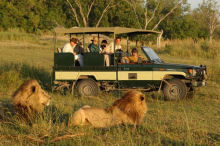 Depending
on your age, income and level of fitness the choices are
many and varied. You can opt for a cycling holiday in Vermont,
trekking in the Nepal Himalayas, a sailing adventure in Thailand,
crossing the Grand Traverse in New Zealand, walking the Inca
trail in South America, scuba diving on the Great Barrier
Reef, a cultural visit to see the Terracotta Army and the
Great Wall of China, or a safari holiday to Massai Mara Game
reserve, in which you explore rather close up and not behind
zoo cages the likes of wild lions, elephants, giraffes and
cheetahs, except you don`t have to sleep in tents, but in
lodges which cater to Western travellers. Depending
on your age, income and level of fitness the choices are
many and varied. You can opt for a cycling holiday in Vermont,
trekking in the Nepal Himalayas, a sailing adventure in Thailand,
crossing the Grand Traverse in New Zealand, walking the Inca
trail in South America, scuba diving on the Great Barrier
Reef, a cultural visit to see the Terracotta Army and the
Great Wall of China, or a safari holiday to Massai Mara Game
reserve, in which you explore rather close up and not behind
zoo cages the likes of wild lions, elephants, giraffes and
cheetahs, except you don`t have to sleep in tents, but in
lodges which cater to Western travellers.
Adventure tourism gains much of its excitement by allowing
its participants to step outside of their comfort zone. This
may be from experiencing culture shock or through the performance
of acts, that require significant effort and involve some
degree of risk (real or perceived) and/or physical danger.
This may include activities such as mountaineering, trekking,
bungee jumping, mountain biking, rafting, zip-lining and rock
climbing. Some obscure forms of adventure travel include disaster
and ghetto tourism. Other rising forms of adventure travel
include social and jungle tourism.
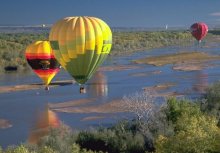 Adventure
travel is to intentionally go beyond one’s normal
known area, seeking out experiences which are unfamilar. This
form of travel can expose travellers to additional health
risks and it is this group of travellers who will probably
benefit the most from taking their own customised medical
kit with them. Adventure
travel is to intentionally go beyond one’s normal
known area, seeking out experiences which are unfamilar. This
form of travel can expose travellers to additional health
risks and it is this group of travellers who will probably
benefit the most from taking their own customised medical
kit with them.
 Adventure
Travellers often travel alone or in small groups on self-organised
trips or on small group organised excursions. They include;
tourists, trekkers, mountaineers, climbers, bikers, canoeists,
scuba divers, etc. etc. The list is endless. Adventure
Travellers often travel alone or in small groups on self-organised
trips or on small group organised excursions. They include;
tourists, trekkers, mountaineers, climbers, bikers, canoeists,
scuba divers, etc. etc. The list is endless.
This type of excursion usually involves travelling on foot,
by bicycle or public transport and staying in simple cheap
accommodation.
The growth of adventure travel has been accompanied
by an enormous variety and availability of adventure travel
companies specialising in international travel and tourism.
A few examples include:
 Both
these types of travellers are also likely to be exposed
to infections and diseases due to the nature of the activity
they are involved in and the locations to which they travel. Both
these types of travellers are also likely to be exposed
to infections and diseases due to the nature of the activity
they are involved in and the locations to which they travel.
They should therefore be extra aware of measures to
prevent illness from food and water, insects and animals and
close personal contact with locals.
Vaccinations should be arranged with a GP's surgery
or travel clinic in plenty of time, ideally at least six weeks
before travelling. Check if malaria is endemic in the region
to be visited. Adventure travellers and backpackers tend to
visit those regions where vaccinations and malaria prphylaxis
are essenrial.
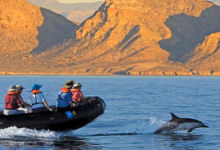 Mosquito
and other insect bites should be minimised through wearing
suitable clothing, applying insect repellents and using mosquito
nets etc. Mosquito
and other insect bites should be minimised through wearing
suitable clothing, applying insect repellents and using mosquito
nets etc.
There is also the risk of accidents occuring when taking
part in risky activities or even when trekking or travelling
on poor roads in badly maintained vehicles.
Backpackers and adventure travellers may find themselves
alternately in major cities with access to medical facilities
and then in remote areas far away from medical help.
They should therefore seriously consider taking a medical
kit for the times when they will be far from help. A comprehensive
first aid kit is important especially if going to areas remote
from medical facilities.
 Contamination
of food and water is a major cause of illness in theese
travellers. Unless certain of the purity of the local water
supply, stick to boiled or bottled water and avoid ice in
drinks. Contamination
of food and water is a major cause of illness in theese
travellers. Unless certain of the purity of the local water
supply, stick to boiled or bottled water and avoid ice in
drinks.
Alternatively, water can be sterilised with iodine
drops/tablets or with a quality filter. Dishes and cutlery
should also be washed with sterilised water. Hot tea, coffee,
beer and wine are usually safe. Ensure that milk has been
pasteurised and that cheese, cream and ice cream are made
from milk that has been pasteurised.
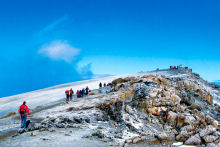 Peel
all fruit, eat only cooked vegetables and avoid salads.
Ensure that seafood, fish and meat are thoroughly cooked and
eaten hot whenever possible. Avoid leftovers. Wash hands before
eating or handling food and always after using the toilet. Peel
all fruit, eat only cooked vegetables and avoid salads.
Ensure that seafood, fish and meat are thoroughly cooked and
eaten hot whenever possible. Avoid leftovers. Wash hands before
eating or handling food and always after using the toilet.
A
situation that is exciting and welcome to one person can
be daunting to another. Possible problems include adjusting
to a different climate, unusual food, religious and cultural
differences, separation from family, changes in living standards,
different social amenities, language differences, coming to
terms with poverty, begging, and compulsory movement restrictions
for safety or political reasons.
Being open to new and different cultures and being patient,
rather than critical, will help the traveller adapt to new
and challenging adventures.
Adventurous trips are those travels that change you,
enchant you and ensure memories for a lifetime. Some travellers
go for the physical thrills and the opportunities that stretch
a body's physical capabilities to the utmost degree. Other
travelers would rather use their minds, eyes, hearing and
cameras to enhance their experiences. Each person's definition
of adventure travel is unique.
 Expedition
Members Expedition
Members
An
expedition typically refers to a
long journey or voyage undertaken for a specific purpose.
Very often they involve travel to
remote and/or mountainous regions of the planet and require
a certain degree of physical fitness in order to carry out
the various activities required.
Expeditions, by their very nature are
similar to adventure holidays so everything in the above section
is also of use for this group. However, expeditions are usually
much longer in duration than most adventure holidays, travel
to even more remote locations and require certain skill levels
and fitness.
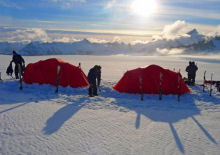 If
you are going on an expedition you are likely to be exposed
to more diseases than other travellers due to the nature of
the location and duration of stay. You will probably interact
more with the local population than other travellers. If
you are going on an expedition you are likely to be exposed
to more diseases than other travellers due to the nature of
the location and duration of stay. You will probably interact
more with the local population than other travellers.
Study, in advance, any necessary measures needed to prevent
infection from contaminated food and water, insects and animals
bites and close contact with locals.
You
will probably be travelling to extremely remote areas
where there is no or limited medical assistance available.
A medical kit together with first aid and surgical equipment
will therefore be essential.
 If
you are leading the expedition it will be your responsibility
to ensure that adequate medical supplies are taken. Consider
taking a course in expedition first aid and emergency procedures. If
you are leading the expedition it will be your responsibility
to ensure that adequate medical supplies are taken. Consider
taking a course in expedition first aid and emergency procedures.
The medical supplies should be appropriate to the type
of expedition and the region and should contain enough supplies
to adequately cover the number of persons in the group for
the duration of the expedition.
Along with the medical supplies, the expedition should
ideally take an expedition doctor or someone qualified in
the diagnosis of illness and the administration of medicines.
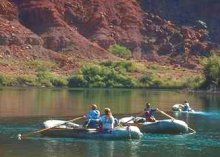 If this is not possible then a handbook with instructions
on the use of medicines should be included but will be a poor
substitute.
If this is not possible then a handbook with instructions
on the use of medicines should be included but will be a poor
substitute.
If mosquito and other insect bites are likely you should
consider taking suitable clothing, insect repellents and mosquito
nets.
Large,
professionally organised expeditions
are likely to have their own expedition doctor complete with
a whole host of medical, surgical & first aid supplies.
Members of expeditions are usually quite fit and in excellent
medical condition and will therefore, respond well to medical
treatment.
An
excellent range of medical items on line such as first
aid kits, sterile surgical kits, insect repellents, mosquito
nets and water purification systems can be obtained from:-
Those who travel
to remote areas on adventure holidays or expeditions should
seriously consider becoming proficient in and obtaining a
first aid qualification from a specialist organisation such
as the First Aid Academy.
 This
group includes those who work abroad; including; embassy
staff, voluntary workers, missionaries, etc. intending to
stay several years in a country. Some people intend to emigrate
permanently whilst others may only intend to visit relatives
for an extended period. Sometimes backpackers fall into this
category e.g. those who take a year out to backpack "round
the world". This
group includes those who work abroad; including; embassy
staff, voluntary workers, missionaries, etc. intending to
stay several years in a country. Some people intend to emigrate
permanently whilst others may only intend to visit relatives
for an extended period. Sometimes backpackers fall into this
category e.g. those who take a year out to backpack "round
the world".
Preparation
should not be rushed. Vaccinations, prevention of malaria
(if appropriate), making enquiries about likely food and water
hygiene problems and other disease risks are all-important.
A brief visit to the proposed destination in advance can help
reduce fear of the unknown.
If you are travelling with children, plan to become
pregnant or have any existing health problems you should plan
well in advance in consultation with your doctor. A dental
and eye check-up prior to departure is wise.
 Backpackers
may find themselves alternately in major cities with access
to medical facilities and then in remote areas far away from
medical help. They should therefore seriously consider taking
a medical kit for the times when they will be far from help. Backpackers
may find themselves alternately in major cities with access
to medical facilities and then in remote areas far away from
medical help. They should therefore seriously consider taking
a medical kit for the times when they will be far from help.
First aid equipment may be important and consider what
you might do in an emergency, particularly those going to
areas remote from or with only basic medical facilities.
The British embassy or high commission may be able
to give give helpful advice about English speaking doctors
and you should keep in touch with the embassy especially in
areas of political unrest.
Homesickness after the initial excitement is common
when you realise the visit is not short-term. Going out of
your way to make new friends and being sensitive to cultural
differences rather than critical will help you adapt more
quickly.
Culture
shock can be very real. If you anticipate
problems of this kind seek counselling before your plans are
finalised. Phone calls and emergency visits home to see relatives
are often easier to arrange than you might imagine.
 |
 |
| Travellers
with Special Needs |
 |
 |
These
include:-
- Children
- Elderly
Travellers
- Pregnant
Women
- Disabled
Travellers
|
1. Children
 Parents
should take special care when travelling
with young children and being prepared in advance is important.
Special seating arrangements in planes can often be arranged
if advance notice is given. Prepare for possible travel sickness.
Boredom during travel can be relieved by books or toys. Parents
should take special care when travelling
with young children and being prepared in advance is important.
Special seating arrangements in planes can often be arranged
if advance notice is given. Prepare for possible travel sickness.
Boredom during travel can be relieved by books or toys.
All children, regardless of their age will require
a valid passport and a visa to enter most countries. Depending
upon their country of origin, most travellers can do the appropriate
paperwork on the plane as they fly out but it is always wise
to check the visa requirements for the destination country
prior to departure.
Most
major or larger hotels are happy to accommodate families,
and finding a good location to stay should not present any
difficulties.Dining, however, may present challenges for families
with younger children since the exotic foods may not appeal
to their palettes.
Vaccinations are important and schedules can differ
for children so seek advice from your doctor or nurse. Doses
of malaria tablets are usually less than for adults.
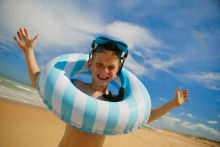 If
children are too young to safely or comfortably be immunized
against disease, the family should postpone travel until everyone
can be sure of effective health measures. If
children are too young to safely or comfortably be immunized
against disease, the family should postpone travel until everyone
can be sure of effective health measures.
Remember to avoid contaminated food and water. If your
child has vomiting or diarrhoea lost fluid and salts must
be replaced. It may be helpful to take rehydration tablets
or powders for reconstituting with boiled water. You can usually
buy these at your local chemist. Dehydration develops quickly
in children so offer frequent cool drinks when it is hot.
Infections such as tuberculosis and diphtheria, spread
from close personal contact with those infected, can be more
serious in young children.
Keep children well away from stray or sick animals
and seek medical advice without delay if any illness persists.
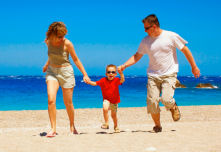 Sun
protection Sun
protection
Studies have found that sunburn during childhood can
increase the risk of skin cancer later in life.
Childrens' skin burns easily in the sun. Take sensible
clothing, high factor sun screens and avoid exposure to 'mid-day'
sun.
Another consideration is the child’s, or children’s,
abilities to deal with the climate of some hot countries.
Travelling abroad with children may involve long periods in
the sun with high humidity.
Use at least a factor 15 sunscreen and apply it to areas that
cannot be protected by clothing, such as the face, ears, feet
and backs of the hands. Choose sunscreens that are formulated
for children and babies' skin:
- Apply
sunscreen before children go outdoors.
- Sunscreen
can easily be washed, rubbed or sweated off, so reapply
it often throughout the day.
- Keep
babies in complete shade, such as under trees, umbrellas,
canopies or indoors.
- Protect
a baby’s skin with loose-fitting clothes and a wide-brimmed
hat that shades their face and neck.
- Make
sure children drink regularly.
Pool
safety:
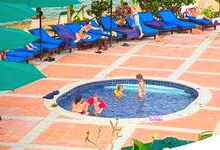 Between
2001 and 2007, 30 British children under 10 drowned in holiday
swimming pools abroad. Children need to be watched constantly.
Don’t depend on a lifeguard, who may not be trained to
UK standards. Between
2001 and 2007, 30 British children under 10 drowned in holiday
swimming pools abroad. Children need to be watched constantly.
Don’t depend on a lifeguard, who may not be trained to
UK standards.
Swimming aids, such as armbands, are great for playing in
the water but can easily slip off. Therefore, you still need
to keep an eye on your child. Always supervise all young children
near water.
Even if a pool has a lifeguard, make sure you know where your
children are and what they're doing in the water.

Travel
Sickness:
Children often get motion sickness more than adults. It rarely
affects children before the age of two, and those between
the ages of three and twelve are the most likely to suffer.
Early symptoms of motion sickness include hot flushes, dribbling
and paleness.
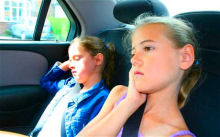 Travel
sickness is often worse on a boat or ship. Staying outside
in the open air, rather than in a stuffy cabin, can assist
in relieving your child’s symptoms. Try to stand in the
middle of the ship on a low deck where there is least movement. Travel
sickness is often worse on a boat or ship. Staying outside
in the open air, rather than in a stuffy cabin, can assist
in relieving your child’s symptoms. Try to stand in the
middle of the ship on a low deck where there is least movement.
Long car journeys, especially along winding roads, can easily
induce nausea. In this scenario, it is your responsibility
to motivate your child to concentrate on the road ahead.
A number of travel sickness remedies are available to reduce
or prevent symptoms of motion sickness.. All need to be taken
before your journey begins. Don’t wait until the symptoms
start making its presence felt.
You can buy them over the counter from pharmacies. Anti-sickness
remedies containing hyoscine are the most effective medicines
for motion sickness. There are several brands of medicines
containing hyoscine and they come as a soluble form for children.
Keeping motion to a minimum may help. For example, sit over
the wing of a plane or on deck in the middle of a boat. Avoid
heavy meals before and during travelling including spicy or
fatty food. If possible, on long journeys, it may help to
have a break and get some fresh air, drink some cold water
and take a short walk. Ginger can improve motion sickness
in some people. It can be taken in ginger biscuits, sweets
or as tablets before a journey.

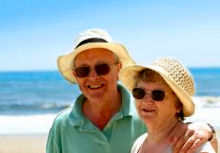 2.
Elderly Travellers 2.
Elderly Travellers
More
and more elderly people are now travelling abroad for
holidays and to visit relatives. Special holidays can be arranged
but age does not give natural protection against disease.
A greater life expectancy, better health in old age and increasing
affluence have given elderly people more time and opportunity
to travel or visit friends and relatives abroad. But there
are some issues that elderly travellers should consider when
planning the journey of a lifetime or a world cruise.
Getting
adequate travel insurance can be a problem, particularly for
those over 75, and especially for those with long-term illnesses
such as diabetes or heart disease. However, purchasing full
insurance is vital.
 Read
the small print of your insurance policy which should include
repatriation in case of illness and ensure there are no important
exclusion clauses. Read
the small print of your insurance policy which should include
repatriation in case of illness and ensure there are no important
exclusion clauses.
Immunisations and malaria prevention remain as important in
the elderly as in people of any other age – if not more
so.
A weakened immune system makes infections more likely. Having
had a disease previously, such as polio or diphtheria, does
not always mean you are immune. If you are prescribed anti
malaria tablets, be sure to mention if you are on any other
medication.
If you suffer from any recurrent illness or are on regular
medication check with your general practitioner. You may find
a check-up helpful to ensure that you are fit to travel. A
referral letter can be useful in case you you need treatment
while abroad.
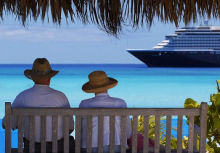 Take
adequate personal medications. These must be clearly labelled
and carried in hand luggage for easy access in case of delays
or loss of luggage. While abroad store your medicines in a
cool dry place. If you are crossing time zones, do not miss
out doses especially if you are diabetic or have a heart condition. Take
adequate personal medications. These must be clearly labelled
and carried in hand luggage for easy access in case of delays
or loss of luggage. While abroad store your medicines in a
cool dry place. If you are crossing time zones, do not miss
out doses especially if you are diabetic or have a heart condition.
Age affects the body’s function, which
can increase the risks of travel generally. Declining
senses can cause accidents or failure to see or hear important
announcements. Poor balance and slow reaction time can increase
the risk of falls and seasickness, and make adventurous walking
more perilous. Thinning bones from osteoporosis increase the
risk of fractures through falls.
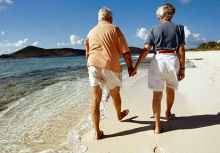 Decreased
lung capacity means there will be less of a reserve to deal
with reduced oxygen at altitude or during chest infections.
Decreased heart capacity makes it harder to bear stresses
on the heart, through dehydration, altitude or exertion. Decreased
lung capacity means there will be less of a reserve to deal
with reduced oxygen at altitude or during chest infections.
Decreased heart capacity makes it harder to bear stresses
on the heart, through dehydration, altitude or exertion.
Remember
to take care to with food and water hygiene.
Reduced stomach acid raises the risk of food poisioning or
infections through contaminated food. Poorer kidney function
raises the risk that dehydration will lead to kidney failure
and makes it harder for the kidneys to cope with salt loss
through diarrhoea.
Poorer circulation leads to slower healing of scratches, bites
and injuries making it more important
to avoid insect and animal bites.
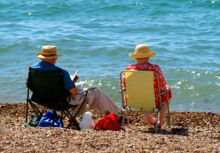
All this means that The elderly are more vulnerable to:
- High
temperatures and heatstroke.
- Deep
vein thrombosis.
- Hypothermia.
- The
effects of low oxygen during air travel and at high altitude
- Fatigue
and exhaustion
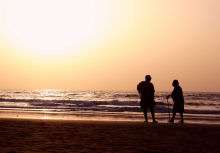 It
is often said that "old age does not come alone".
Age often brings with it long-term illness. This can also
lead to various problems which arise during foreign travel; It
is often said that "old age does not come alone".
Age often brings with it long-term illness. This can also
lead to various problems which arise during foreign travel;
There are more tablets to remember or worry about forgetting.
Diuretics for high blood pressure can increase the risks of
dehydration. Drugs for Parkinson's disease and for high blood
pressure can cause dizziness, fainting, unsteadiness and falls.
There is a higher incidence of diabetes in older people which
can be more difficult to control overseas. A loss of intellectual
function may be exposed - causing someone to struggle to cope
with their changed surroundings.
Prescription medicines should be ordered in advance of a foreign
holiday and packed in carry on luggage. They may be difficult
to obtain abroad. Be aware that some medicines may be illegal
in foreign countries, e.g. medicines containing codeine.
Some
importat issues to consider if you are elderly and travelling
or taking elderly people overseas:
- Good
insurance should be obtained.
- Travel
should be planned carefully.
- A pre-travel
consultation should be booked at the travel clinic.
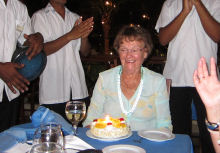 Contingencies
should be planned for. Contingencies
should be planned for.- Journeys
should not be over-ambitious and there must be plenty of
rest stops.
- Choose
destinations with western equivalent medical facilities
and infrastructure.
- Medication
should be kept in hand luggage, with plenty of spare supplies.
- Travellers
should take their time to ease the risks and stresses of
travel.
Please
note: Even after taking all the preceding information into
account, elderly people still can and often do travel without
encountering any serious problems.
It is important to bear in mind that many elderly people
enjoy foreign travel and should not be prevented from doing
so if they feel up to it. Indeed, nowadays many people enjoy
good health and reasonable fitness well into their 70s &
80s.
3.
Travel During Pregnancy
 Travelling
during pregnancy is usually possible and with the proper precautions,
and armed with information on when to travel, vaccinations
and insurance, most women can travel safely well into their
pregnancy. Travelling
during pregnancy is usually possible and with the proper precautions,
and armed with information on when to travel, vaccinations
and insurance, most women can travel safely well into their
pregnancy.
Always
undergo a medical check-up before planning your trip and again
shortly before departure. It is important to get the 'all
clear' from your own doctor or obstetrician before departure.
It’s a good idea to take your medical records with you
so you can give doctors the relevant information if necessary.
 Wherever
you go, find out what healthcare facilities are available
at your destination in case you require urgent medical attention. Wherever
you go, find out what healthcare facilities are available
at your destination in case you require urgent medical attention.
Ante-natal facilities vary greatly between countries and you
should think carefully before travelling to a country with
poor medical facilities or where there are major cultural
and language differences from home. This could be important
if you have health problems such as threatening to miscarry
or going into early labour.
Make sure your travel insurance covers you for any eventuality,
such as pregnancy-related medical care during labour, premature
birth and the cost of changing the date of your return trip
if you go into labour. Bear in mind that insurance policies
are only as good as the facilities available.
Some women prefer not to travel in the first 12 weeks of pregnancy
because of exhaustion and nausea during these early stages.
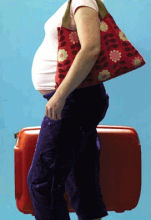 Whether
you're travelling or not, the risk of miscarriage is higher
in the first three months. Whether
you're travelling or not, the risk of miscarriage is higher
in the first three months.
However, if you feel well there’s no reason why you can’t
travel at this time. If you have any worries, discuss them
with your midwife or doctor.
Travel during pregnancy can be a concern for many women, but
if your pregnancy has no complications then there’s no
reason why you can’t travel safely, as long as you take
the right precautions.
Some airlines will not accept a pregnant traveller after 28
to 32 weeks gestation and long air flights in the later stages
can be very uncomfortable. The most risky times for travel
are during the first 12 to 15 weeks of pregnancy when miscarriage
is more likely.
Flying is not harmful to you or your baby, but discuss any
health issues or pregnancy complications with your midwife
or doctor before you fly.
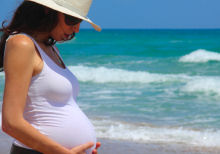 The
likelihood of going into labour is naturally higher after
37 weeks (around 34 weeks if you're carrying twins), and some
airlines will not let you fly towards the end of your pregnancy.
Check with the airline for their policy on this. The
likelihood of going into labour is naturally higher after
37 weeks (around 34 weeks if you're carrying twins), and some
airlines will not let you fly towards the end of your pregnancy.
Check with the airline for their policy on this.
After week 28 of pregnancy, the airline may ask for a letter
from your doctor or midwife confirming your due date, and
that you aren't at risk of complications.
 Long-distance
travel (longer than five hours) carries a small risk of blood
clots (deep vein thrombosis, or DVT) in pregnant women. If
you fly, drink plenty of water and move about regularly –
every 30 minutes or so. You can buy a pair of support stockings
in the pharmacy over the counter, which will reduce leg swelling. Long-distance
travel (longer than five hours) carries a small risk of blood
clots (deep vein thrombosis, or DVT) in pregnant women. If
you fly, drink plenty of water and move about regularly –
every 30 minutes or so. You can buy a pair of support stockings
in the pharmacy over the counter, which will reduce leg swelling.
Appropriate immunisation and malaria prevention is sometimes
difficult during pregnancy so seek advice. Some vaccines are
best avoided during pregnancy, for example live vaccines.
However vaccination may be safer than travelling to some high
risk areas without protection.
Vaccines are generally not recommended because of concerns
that the virus or bacteria in the jab could harm the baby
in the womb. You are advised to avoid travelling to countries
where immunisation is required. Live vaccines should not be
routinely administered to pregnant women because of possible
risk to the unborn child.
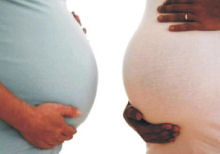 However,
if you must travel to areas requiring inoculation, you should
get vaccinated because the risk of catching an infectious
disease far outweighs the risk from vaccination. One example
of this is yelow fever. However,
if you must travel to areas requiring inoculation, you should
get vaccinated because the risk of catching an infectious
disease far outweighs the risk from vaccination. One example
of this is yelow fever.
Travel to malarious zones during pregnancy should be avoided.
However, if travel is unavoidable, effective prophylaxis should
be used as malaria is more severe during pregnancy and the
risk of malaria to mother and fetus is greater than the risk
from any anti-malarial drugs. Some anti-malaria tablets aren't
safe to take in pregnancy. You should consult your GP or pharmacist
for advice.
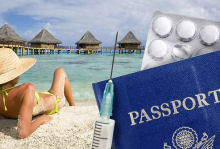 Chloroquine
and Proguanil may be taken in usual doses throughout pregnancy
but pregnant women taking Proguanil should be supplemented
with folic acid. Mefloquine is not licensed for use during
pregnancy and should normally be avoided. Doxycycline is contra-indicated
during pregnancy and the safety of Malarone during pregnancy
has not been established. Therefore travel to areas where
chloroquine resistance occurs is strongly discouraged. Chloroquine
and Proguanil may be taken in usual doses throughout pregnancy
but pregnant women taking Proguanil should be supplemented
with folic acid. Mefloquine is not licensed for use during
pregnancy and should normally be avoided. Doxycycline is contra-indicated
during pregnancy and the safety of Malarone during pregnancy
has not been established. Therefore travel to areas where
chloroquine resistance occurs is strongly discouraged.
Illness during pregnancy can be more severe so take special
care to avoid contaminated food and water and insect and animal
bites. Avoid partially cooked meat, unpasteurised milk products
and soft cheeses.
In some countries infections such as tuberculosis or meningitis
can be spread from close personal contact with locals and
these can be serious during pregnancy both to yourself and
your unborn child.
 Take
care to avoid contaminated food and water which could lead
to conditions such as stomach upsets and travellers’
diarrhoea (TD). But even if you are suffering from diarrhoea
and vomiting, it is very unlikely that your baby will be harmed
by a short-lived tummy bug. Take
care to avoid contaminated food and water which could lead
to conditions such as stomach upsets and travellers’
diarrhoea (TD). But even if you are suffering from diarrhoea
and vomiting, it is very unlikely that your baby will be harmed
by a short-lived tummy bug.
Some medicines for treating stomach upsets and TD such as
Imodium aren’t suitable during pregnancy. However, it
is safe to take oral rehydration salts. Drink as much water
or clear fluids as you are able to tolerate. If you are finding
it hard even to keep water down, take tiny sips through a
straw.
Always
drink bottled water where possible. If you get ill, keep well
hydrated and continue eating for the health of your baby,
even if you may not be hungry.
Road accidents are among the most common causes of injury
in pregnant women. Avoid making long trips on your own and
get your companion to drive if possible or at least share
the driving.
 4.
Disabled Travellers 4.
Disabled Travellers
Travelling
with a disability is now commonplace
and there is no reason why this should pose serious problems
if good preparations are made. The more you know about a place,
the less likely you are to experience problems or obstacles,
so before you travel, do your homework.
Adapting to unexpected situations is a part of the
challenge of travelling but advance knowledge of facilities
available, during travel and at your destination, can be very
important. Some organisations and tour companies arrange trips
for the disabled when mobility problems, for example, are
taken into account.
The
Disabled Traveller’s Guide to Planning a Long Holiday
has been specifically created to bring a choice of holiday
opportunities to those living with special needs and mobility
difficulties.
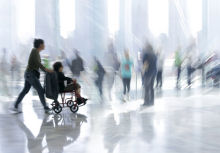 People
with a disability often experience problems when travelling.
However, in many cases these problems are not directly related
to their disability, but rather discrimination. Some of the
most common forms of discrimination are; denied boarding,
degrading treatment, poor assistance, additional charges to
receive assistance and loss or damage to mobility equipment
and assistive devices. People
with a disability often experience problems when travelling.
However, in many cases these problems are not directly related
to their disability, but rather discrimination. Some of the
most common forms of discrimination are; denied boarding,
degrading treatment, poor assistance, additional charges to
receive assistance and loss or damage to mobility equipment
and assistive devices.
Airlines
are usually helpful and provide assistance at airports
and offer special facilities on aircraft if advised in advance.
However this may not be the case with some airlines and at
small airports especially in African, Asian and South American
countries.
Most people will agree that getting on a flight is almost
as easy as taking a train or a bus these days. However, it
is still an adventure for many travellers with a disability,
reduced mobility or visual and hearing impairments.
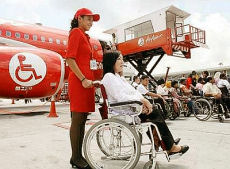 The
whole process of check in, security etc. is much more difficult
for disabled travellers who are often faced with problems
from the very moment they arrive at the airport to leaving
the airport at their destination. The
whole process of check in, security etc. is much more difficult
for disabled travellers who are often faced with problems
from the very moment they arrive at the airport to leaving
the airport at their destination.
It is also a good idea to arrive at the airport in good time
so that you can find your way around and avoid any mishaps.
It will also give you plenty of time to register and label
your wheelchair so that it doesn’t get lost along the
way….and to pick the best seat on the plane.
You should check in at least two hours before international
flights and 90 minutes before domestic flights.
Most airports and airlines have special facilities and assistance
for travellers using crutches, a guide dog or a wheelchair.
However, there is always room for improvement.
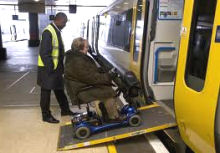 Before
you set off you should ring the airport or check its website
to find out what facilities it has. Find out if it has disabled
parking spaces, elevators, disabled toilets etc. Before
you set off you should ring the airport or check its website
to find out what facilities it has. Find out if it has disabled
parking spaces, elevators, disabled toilets etc.
Some airports have special check-in desks for wheelchair users.
You should check out the airport’s website to find out
or ring in advance.
In 2008, the Disabled Air Passengers' Rights Regulation was
put in force by the European Union in order to prevent these
forms of discrimination.
Wheelchair users often have problems which most travellers
who do not use a wheelchair are unaware of. Up until only
recently some airlines charged wheelchair users to take their
wheelchair from check-in to the aircraft. Other airlines refused
some wheelchair users to fly as they claimed there were too
many disabled travellers on the flight.
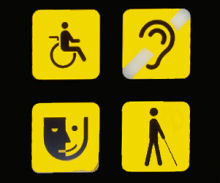 Thanks
to the law, airlines can no longer make these excuses. In
fact, most airlines offer very good services for disabled
travellers and they are aware that wheelchair users need more
space and an aisle seat aboard the aircraft, as well as ground
and onboard assistance etc. Thanks
to the law, airlines can no longer make these excuses. In
fact, most airlines offer very good services for disabled
travellers and they are aware that wheelchair users need more
space and an aisle seat aboard the aircraft, as well as ground
and onboard assistance etc.
In other cases, blind travellers were unable to fly accompanied
by their guide dog and were not entitled to any form of aid
to get from check-in to the aircraft. Thankfully, this is
no longer the case today.
These regulations have helped to make travelling a right for
everyone. However, discrimination is something that will be
difficult to eliminate completely. If you experience neglect
and maltreatment at an airport you should make the relative
authorities aware.
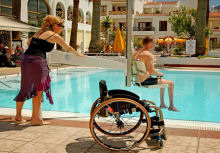 When
selecting accommodation check good lifts are available, the
condition of staircases and bathroom equipment. Ask in advance
if special food requirements are necessary. When
selecting accommodation check good lifts are available, the
condition of staircases and bathroom equipment. Ask in advance
if special food requirements are necessary.
Make
sure that you have comprehensive health insurance with no
important exclusion clauses which affect disability and
which includes repatriation if necessary.
Many travellers share their experiences online and so this
also may be helpful for you. It is an excellent way of helping
you decide which airline to choose and may give you more
information about the help available for passengers with
reduced mobility, a visual impairment or some other form
of disability.
All these comments are written by people who have tried
and tested the services. They write based on their experiences
and so all feedback and comments about the airport facilities
or the airlines are unbiased.
Some useful web sites relating to disabled travel are:
|